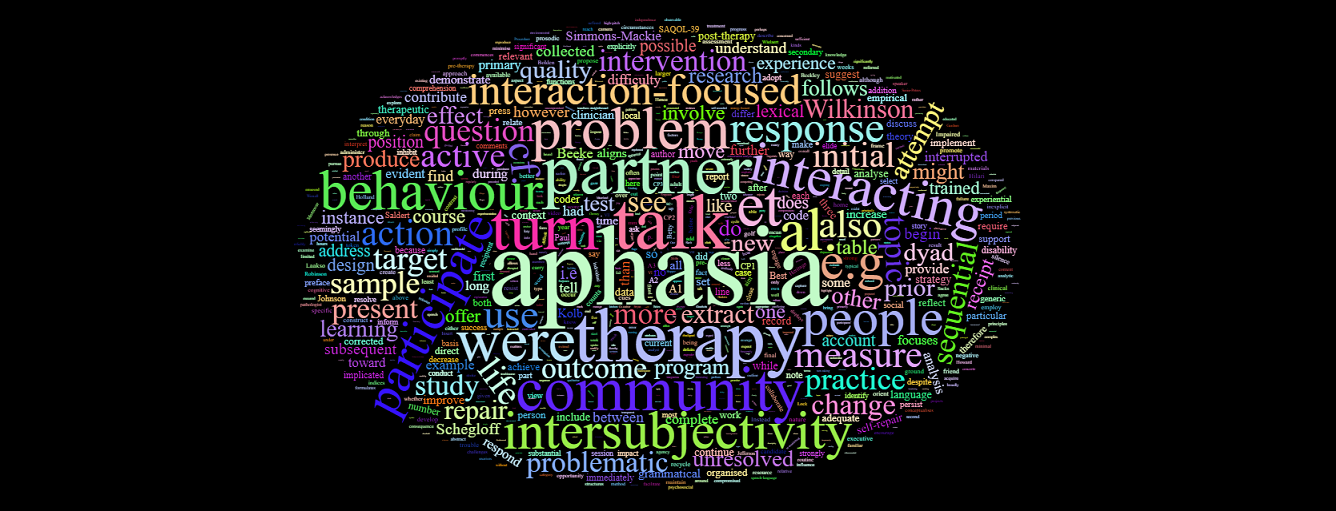Acquired Communication Disorders

Speech, language, and communication are supported by complex motor and cognitive systems. These systems can be impaired during adulthood by brain damage (e.g., stroke, traumatic brain injury) or disease (e.g., dementia, motor neurone disease, Parkinson’s Disease), resulting in acquired communication disorders.
Speech pathologists diagnose and provide intervention for acquired communication disorders. In order to support these activities, researchers in the Department of Linguistics at Macquarie conduct research on the nature of impairments to motor and cognitive systems, the effects of impairments on communication, and speech pathology strategies for assessment and intervention.
Areas of interest
- Aphasia, traumatic brain injury, and right hemisphere communication disorder
- Conversation therapy, and conversation partner training
- Measurement of dysarthria and its impact on everyday life
- Measurement of communication; particularly, conversation
- Effective speech pathology assessment and intervention
- Assessment and intervention for multilingual people with aphasia
Current projects
Right hemisphere damage and everyday conversation
Dr Scott Barnes, Prof. Lyndsey Nickels, Dr Suzanne Beeke, Dr Steven Bloch, Prof. Wendy Best
Damage to the right hemisphere of the brain can substantially impact cognition and communication. There is very little empirical evidence on how these (and other) cognitive impairments affect everyday conversation for people who have experienced right hemisphere damage (e.g., stroke, traumatic brain injury). This project is exploring how right hemisphere damage changes conversation, with a view to improved speech pathology diagnosis and intervention for people with right hemisphere damage. This project is funded by the Macquarie University Research Development Grant Scheme. For further information go to: https://osf.io/bmrz6/
Aphasia, correction, and micro-collaboration
Dr Scott Barnes, Dr Francesco Possemato
Interactions involving people with aphasia involve extended periods of collaborative conversation repair. A striking example of this is persistent cueing and correction in everyday conversation. This project addresses the linguistic and multimodal practices that interactants implement in order to enter, sustain, and exit engagement with this type of repair. It also explores the relational implications of persistent attention to talk at this level of granularity, focusing on the moral properties of talk as a semiotic resource. The findings of this project will offer novel information about how aphasia affects everyday life, and explore how a technical analysis of the internal dynamics of turns in conversation can be employed in aphasia rehabilitation.
Verbosity and traumatic brain injury
Dr Scott Barnes, Janine Mullay, Jason Bransby, Christine Taylor
People who have suffered a traumatic brain injury experience diverse and variable problems for communication. One symptom experienced by people with traumatic brain injury is verbosity (i.e., over-talkativeness). This project will examine verbosity as a disruption to the turn-taking system for conversation. Specifying the nature of verbosity, and the behaviours associated with it, will be valuable for diagnosing the presence and severity of verbosity following traumatic brain injury, and designing speech pathology assessment and intervention strategies targeting it.
Turn-taking in Bahasa Indonesia: A study of typical and atypical interactions
Fakry Hamdani, Dr Scott Barnes
Bahasa Indonesia is one of the most commonly spoken languages in the world. It is derived from Malay, and is the official language of Indonesia. There are few studies concerning how aphasia manifests in speakers of Indonesian, and no evidence relating to their communication during everyday life. This study will document and analyse interactions involving people with aphasia who speak Indonesian, and examine the linguistic practices they adopt.
Our People
Academic staff
Associate Professor Peter Roger
Research officers
Sophie Toocaram
Current research students
Fakry Hamdani (PhD)
Natalie Skinner (MRes)
Collaborators
Dr Suzanne Beeke (UCL); Prof. Wendy Best (UCL); Dr Steven Bloch (UCL); Jason Bransby (Royal Rehab); Prof. Lyndsey Nickels (MQ); Janine Mullay (Royal Rehab)
Contact Us
For further information about acquired communication disorders research in the Department of Linguistics, or to enquire about research supervision in this area, please contact Dr Scott Barnes.
For enquiries relating to speech pathology practice with acquired communication disorders, or for advice or a consultation relating to workplace speech pathology research, please contact Dr Scott Barnes and Ms Christine Taylor.
Content owner: Department of Linguistics Last updated: 12 Mar 2024 10:18am
